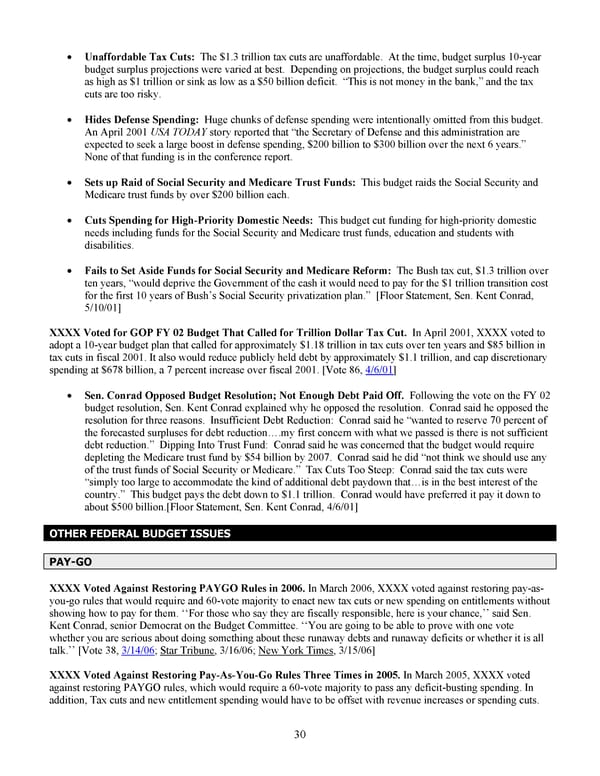Unaffordable Tax Cuts: The $1.3 trillion tax cuts are unaffordable. At the time, budget surplus 10-year budget surplus projections were varied at best. Depending on projections, the budget surplus could reach as high as $1 trillion or sink as low as a $50 billion deficit. “This is not money in the bank,” and the tax cuts are too risky. Hides Defense Spending: Huge chunks of defense spending were intentionally omitted from this budget. An April 2001 USA TODAY story reported that “the Secretary of Defense and this administration are expected to seek a large boost in defense spending, $200 billion to $300 billion over the next 6 years.” None of that funding is in the conference report. Sets up Raid of Social Security and Medicare Trust Funds: This budget raids the Social Security and Medicare trust funds by over $200 billion each. Cuts Spending for High-Priority Domestic Needs: This budget cut funding for high-priority domestic needs including funds for the Social Security and Medicare trust funds, education and students with disabilities. Fails to Set Aside Funds for Social Security and Medicare Reform: The Bush tax cut, $1.3 trillion over ten years, “would deprive the Government of the cash it would need to pay for the $1 trillion transition cost for the first 10 years of Bush’s Social Security privatization plan.” [Floor Statement, Sen. Kent Conrad, 5/10/01] XXXX Voted for GOP FY 02 Budget That Called for Trillion Dollar Tax Cut. In April 2001, XXXX voted to adopt a 10-year budget plan that called for approximately $1.18 trillion in tax cuts over ten years and $85 billion in tax cuts in fiscal 2001. It also would reduce publicly held debt by approximately $1.1 trillion, and cap discretionary spending at $678 billion, a 7 percent increase over fiscal 2001. [Vote 86, 4/6/01] Sen. Conrad Opposed Budget Resolution; Not Enough Debt Paid Off. Following the vote on the FY 02 budget resolution, Sen. Kent Conrad explained why he opposed the resolution. Conrad said he opposed the resolution for three reasons. Insufficient Debt Reduction: Conrad said he “wanted to reserve 70 percent of the forecasted surpluses for debt reduction….my first concern with what we passed is there is not sufficient debt reduction.” Dipping Into Trust Fund: Conrad said he was concerned that the budget would require depleting the Medicare trust fund by $54 billion by 2007. Conrad said he did “not think we should use any of the trust funds of Social Security or Medicare.” Tax Cuts Too Steep: Conrad said the tax cuts were “simply too large to accommodate the kind of additional debt paydown that…is in the best interest of the country.” This budget pays the debt down to $1.1 trillion. Conrad would have preferred it pay it down to about $500 billion.[Floor Statement, Sen. Kent Conrad, 4/6/01] OTHER FEDERAL BUDGET ISSUES PAY-GO XXXX Voted Against Restoring PAYGO Rules in 2006. In March 2006, XXXX voted against restoring pay-as- you-go rules that would require and 60-vote majority to enact new tax cuts or new spending on entitlements without showing how to pay for them. ‘‘For those who say they are fiscally responsible, here is your chance,’’ said Sen. Kent Conrad, senior Democrat on the Budget Committee. ‘‘You are going to be able to prove with one vote whether you are serious about doing something about these runaway debts and runaway deficits or whether it is all talk.’’ [Vote 38, 3/14/06; Star Tribune, 3/16/06; New York Times, 3/15/06] XXXX Voted Against Restoring Pay-As-You-Go Rules Three Times in 2005. In March 2005, XXXX voted against restoring PAYGO rules, which would require a 60-vote majority to pass any deficit-busting spending. In addition, Tax cuts and new entitlement spending would have to be offset with revenue increases or spending cuts. 30
 HRC vote skeleton Page 34 Page 36
HRC vote skeleton Page 34 Page 36